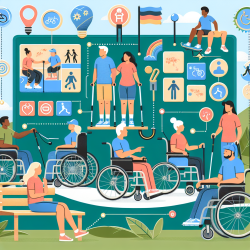Unlocking the Power of CBT for Social Anxiety in First-Episode Psychosis
As a practitioner in the field of mental health, it's crucial to stay informed about the latest research and methodologies that can enhance your therapeutic skills. One such area of interest is the application of Cognitive Behavioral Therapy (CBT) for treating social anxiety in individuals experiencing their first episode of psychosis. A recent study titled "Manualized group cognitive behavioral therapy for social anxiety in first-episode psychosis: a randomized controlled trial" sheds light on this topic.
Understanding the Study
The study explored the efficacy of a group CBT intervention specifically designed for young individuals with social anxiety who have experienced a first episode of psychosis (FEP). The primary goal was to assess whether this intervention could reduce social anxiety symptoms and improve overall functioning compared to cognitive remediation (CR), an active control.
Key Findings
- Reduction in Social Anxiety: Both CBT and CR interventions showed significant reductions in social anxiety symptoms over time. However, the CBT group exhibited more pronounced improvements in negative symptoms and overall functioning.
- Improved Functioning: The CBT group reported better outcomes in social and occupational functioning, as well as self-reported recovery, indicating the intervention's broader impact beyond just reducing social anxiety symptoms.
- Decreased Self-Stigma: Participants in the CBT group experienced a reduction in self-stigmatization, highlighting the intervention's role in improving self-perception and social interactions.
Implications for Practitioners
For practitioners, these findings underscore the potential benefits of incorporating CBT into treatment plans for young individuals with FEP and social anxiety. Here are some practical takeaways:
- Focus on Comprehensive Interventions: Consider integrating CBT modules that address cognitive restructuring, social skills training, and exposure therapy to enhance treatment outcomes.
- Monitor Long-Term Effects: Pay attention to the long-term benefits of CBT, such as improved functioning and reduced self-stigma, which can contribute to better overall recovery.
- Encourage Social Engagement: Facilitate group settings that promote social interaction and exposure, as these elements can significantly impact social anxiety symptoms.
Encouraging Further Research
While this study provides valuable insights, it also opens the door for further research to explore the nuances of CBT in different contexts and populations. Practitioners are encouraged to stay engaged with ongoing research and consider contributing to studies that examine the effectiveness of various therapeutic approaches.
To read the original research paper, please follow this link: Manualized group cognitive behavioral therapy for social anxiety in first-episode psychosis: a randomized controlled trial.










